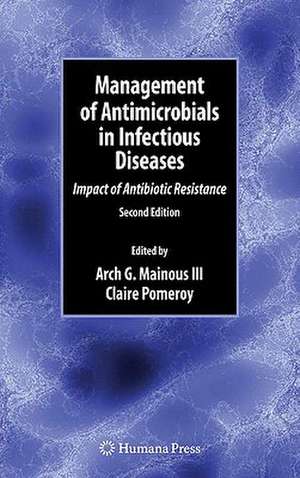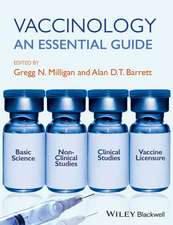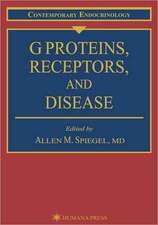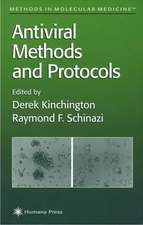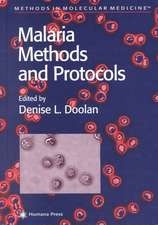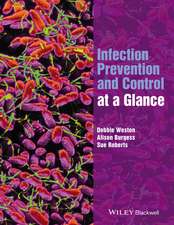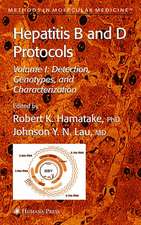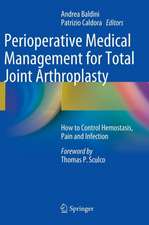Management of Antimicrobials in Infectious Diseases: Impact of Antibiotic Resistance: Infectious Disease
Editat de Arch G. Mainous III, Claire Pomeroyen Limba Engleză Hardback – 23 feb 2010
Thus, we think that given these developments, clinicians would welcome an updated version of this book. A resource indicating appropriate, evidence-based antimicrobial treatment of infectious diseases encountered in both the hospital and outpatient settings would be of significant value to practicing clinicians. The book would focus on the clinical importance of appropriate diagnosis and treatment of infectious diseases particularly in terms of antibiotic-resistance. The resource would be valuable to countless numbers of junior-level practitioners (residents, nurse practitioners, physician-assistants). Moreover, the book could be a resource for generalists as well as infectious disease specialists.
| Toate formatele și edițiile | Preț | Express |
|---|---|---|
| Paperback (1) | 1726.01 lei 6-8 săpt. | |
| Humana Press Inc. – 3 mai 2012 | 1726.01 lei 6-8 săpt. | |
| Hardback (1) | 1414.29 lei 6-8 săpt. | |
| Humana Press Inc. – 23 feb 2010 | 1414.29 lei 6-8 săpt. |
Din seria Infectious Disease
- 5%
 Preț: 1435.28 lei
Preț: 1435.28 lei - 5%
 Preț: 1430.35 lei
Preț: 1430.35 lei - 18%
 Preț: 723.51 lei
Preț: 723.51 lei - 5%
 Preț: 801.13 lei
Preț: 801.13 lei - 5%
 Preț: 683.00 lei
Preț: 683.00 lei - 5%
 Preț: 1110.72 lei
Preț: 1110.72 lei - 5%
 Preț: 1094.25 lei
Preț: 1094.25 lei - 5%
 Preț: 1414.80 lei
Preț: 1414.80 lei - 5%
 Preț: 1101.37 lei
Preț: 1101.37 lei - 5%
 Preț: 790.88 lei
Preț: 790.88 lei - 5%
 Preț: 1027.12 lei
Preț: 1027.12 lei - 5%
 Preț: 1364.19 lei
Preț: 1364.19 lei - 18%
 Preț: 1280.72 lei
Preț: 1280.72 lei - 5%
 Preț: 2038.58 lei
Preț: 2038.58 lei - 18%
 Preț: 944.99 lei
Preț: 944.99 lei - 5%
 Preț: 1113.99 lei
Preț: 1113.99 lei - 5%
 Preț: 1431.81 lei
Preț: 1431.81 lei - 5%
 Preț: 1121.69 lei
Preț: 1121.69 lei - 5%
 Preț: 1117.65 lei
Preț: 1117.65 lei - 5%
 Preț: 1612.30 lei
Preț: 1612.30 lei - 5%
 Preț: 723.05 lei
Preț: 723.05 lei - 18%
 Preț: 1253.42 lei
Preț: 1253.42 lei - 5%
 Preț: 1321.68 lei
Preț: 1321.68 lei - 5%
 Preț: 1427.62 lei
Preț: 1427.62 lei - 5%
 Preț: 725.03 lei
Preț: 725.03 lei - 5%
 Preț: 712.60 lei
Preț: 712.60 lei
Preț: 1414.29 lei
Preț vechi: 1488.72 lei
-5% Nou
Puncte Express: 2121
Preț estimativ în valută:
270.66€ • 279.61$ • 225.26£
270.66€ • 279.61$ • 225.26£
Carte tipărită la comandă
Livrare economică 25 martie-08 aprilie
Preluare comenzi: 021 569.72.76
Specificații
ISBN-13: 9781603272384
ISBN-10: 1603272380
Pagini: 300
Ilustrații: X, 399 p. 3 illus., 2 illus. in color.
Dimensiuni: 155 x 235 x 31 mm
Greutate: 0.53 kg
Ediția:2nd ed. 2010
Editura: Humana Press Inc.
Colecția Humana
Seria Infectious Disease
Locul publicării:Totowa, NJ, United States
ISBN-10: 1603272380
Pagini: 300
Ilustrații: X, 399 p. 3 illus., 2 illus. in color.
Dimensiuni: 155 x 235 x 31 mm
Greutate: 0.53 kg
Ediția:2nd ed. 2010
Editura: Humana Press Inc.
Colecția Humana
Seria Infectious Disease
Locul publicării:Totowa, NJ, United States
Public țintă
Professional/practitionerCuprins
Significant Pathogens.- Antibiotic Resistance and Implications for the Appropriate Use of Antimicrobial Agents.- Antimicrobial Resistance Among Epidemiologically Important Gram-Positive Bacteria.- Gram-Negative Bacteria.- Tuberculosis.- Community-Acquired Viral Infections.- Influenza.- Invasive Fungal Infections.- Evidence-Based Management of Infectious Diseases.- Upper Respiratory Infections and Acute Bronchitis.- Pneumonia.- Urinary Tract Infections.- Sexually Transmitted Diseases.- Gastrointestinal Tract Infections.- Endocarditis.- Infections of the Central Nervous System.- Uncomplicated Skin and Soft Tissue Infections.- Septic Arthritis and Osteomyelitis.- Human Immunodeficiency Virus (HIV): Acquired Immune Deficiency Syndrome (AIDS).- Special Considerations.- Strategies for Optimal Antimicrobial Use.- Infections in the Immunocompromised Host.- Future Trends in Antimicrobial Use.
Recenzii
From the reviews of the second edition:
"This book is designed as a resource for those who use evidence-based medicine in the treatment of infectious diseases in both inpatient and outpatient settings....provide in one place a good overview of the problem with sufficient detail to meet its goal as a resource book." -Doody's Health Sciences Book Review Journal
"Management of Antimicrobials in Infectious Diseases is primarily focused on providing evidence based clinical recommendations. At the conclusion of each chapter the author or authors present the "Key Points" by providing bulleted highlights they feel are important and allows the reader a process in which to review and retain the topic in a concise manner. . .useful for practicing community pharmacists with a background in infectious diseases, but would not be helpful as a quick reference. Clinical Pharmacy Specialists in infectious disease would benefit most from this textbook. However, clinical pharmacy generalists who treat patients with infections would also benefit from this fine book. Pharmacists who serve on infection control committees would find this book an asset. Other members of infection controls committees would also benefit from this text. For practicing hospital pharmacists and drug information centers Management of Antimicrobials in Infectious Diseases should be added to the reference library as it not only provides excellent recommendations for treating common infectious diseases commonly seen in a hospital setting, but an extensive list of reference articles for each chapter as well. Clinical pharmacists may find this textbook useful when researching a specific disease treatment." -Journal of Pharmacy Practice
"This book emphasizes the importance of taking into account the development of resistance to antimicrobials. Several chapters appropriately emphasize the effects of the addition of antibiotics to livestock feeds and processed meat products. The antibiotics used in such processes, ...It is well suited for microbiologists and infectious disease clinicians interested in basic science aspects of antibiotic resistance...Mainous and Pomeroy's book is important because it is more likely to be read by practitioners prescribing antibiotics than are the other two more specialized texts. Infectious disease clinicians interested in antimicrobials or the emergence of antimicrobial resistance often fail to communicate the significance of their basic science findings to their colleagues who work in the clinical setting...Pomeroy's book, although basic and not perfect, nonetheless reminds the practitioners who prescribe most of the antibiotics used in the world that, before they select an antibiotic to treat a particular patient, they should carefully consider the agent's potential to foster the emergence of resistance...Importantly, it is addressed to clinicians, who are the main prescribers of antibiotics worldwide...Drs. Mainous and Pomeroy are to be congratulated for making an important attempt to reach those whose prescribing habits will influence resistance trends." - Clinical Infectious Diseases
“The distinguished contributors provide a practical summary of the most effective evidence-based antimicrobial treatments encountered in both hospital and outpatient settings and emphasize the influence of appropriate diagnosis and treatment. Increasing problems with resistant pathogens are troublesome to comprehensive therapists, both for outpatients and for hospitalized patients … receiving the greater attention. … ‘A myriad or new or increased disease management issues with implications for antibiotic resistance have appeared upon the landscape and many continue to challenge us. Consequently this book has been updated substantially.’” (William H. Wehrmacher and Harry Messmore, Comprehensive Therapy, August, 2010)
“This is a relatively expensive mini-textbook on infectious diseases. The informationcontained therein is generally accurate … the level of detail potentially pitches the text somewhere between the main two stated target audiences (general physicians and infectious diseases specialists). … The use of key points for each chapter is useful … .” (Mark H. Wilcox, Microbiology Today, 2010)
“Antimicrobial resistance poses a daily challenge in clinical practice. … In this new book the authors briefly discuss the epidemiology and diagnosis of the main infectious diseases seen in daily clinical practice, helping the clinician to rapidly review these matters, before they go into antimicrobial therapy. … The book is structured in a highly readable format and is a very useful resource for medicine students, generalist physicians, and for those embarking on their infectious disease specialization.” (Jorge Luiz Mello Sampaio and Elsa Mamizuka, Brazilian Journal of Pharmaceutical Sciences, May, 2010)
“Covers a wide variety of pathogens and clinical syndromes using up-to-date clinical information on problematic as well as resistant microbes. … written with clinicians in mind, ranging from the most experienced infectious diseases physicians to students involved in clinical care. … useful to any practitioner who routinely cares for patients with infections. … this book has merit by coupling the most recently available evidence-based guidelines with difficult-to-treat organisms. … easy to read and reward clinicians with useful information in a minimal amount of time.” (John S. Czachor, Doody’s Review Service, July, 2010)
"This book is designed as a resource for those who use evidence-based medicine in the treatment of infectious diseases in both inpatient and outpatient settings....provide in one place a good overview of the problem with sufficient detail to meet its goal as a resource book." -Doody's Health Sciences Book Review Journal
"Management of Antimicrobials in Infectious Diseases is primarily focused on providing evidence based clinical recommendations. At the conclusion of each chapter the author or authors present the "Key Points" by providing bulleted highlights they feel are important and allows the reader a process in which to review and retain the topic in a concise manner. . .useful for practicing community pharmacists with a background in infectious diseases, but would not be helpful as a quick reference. Clinical Pharmacy Specialists in infectious disease would benefit most from this textbook. However, clinical pharmacy generalists who treat patients with infections would also benefit from this fine book. Pharmacists who serve on infection control committees would find this book an asset. Other members of infection controls committees would also benefit from this text. For practicing hospital pharmacists and drug information centers Management of Antimicrobials in Infectious Diseases should be added to the reference library as it not only provides excellent recommendations for treating common infectious diseases commonly seen in a hospital setting, but an extensive list of reference articles for each chapter as well. Clinical pharmacists may find this textbook useful when researching a specific disease treatment." -Journal of Pharmacy Practice
"This book emphasizes the importance of taking into account the development of resistance to antimicrobials. Several chapters appropriately emphasize the effects of the addition of antibiotics to livestock feeds and processed meat products. The antibiotics used in such processes, ...It is well suited for microbiologists and infectious disease clinicians interested in basic science aspects of antibiotic resistance...Mainous and Pomeroy's book is important because it is more likely to be read by practitioners prescribing antibiotics than are the other two more specialized texts. Infectious disease clinicians interested in antimicrobials or the emergence of antimicrobial resistance often fail to communicate the significance of their basic science findings to their colleagues who work in the clinical setting...Pomeroy's book, although basic and not perfect, nonetheless reminds the practitioners who prescribe most of the antibiotics used in the world that, before they select an antibiotic to treat a particular patient, they should carefully consider the agent's potential to foster the emergence of resistance...Importantly, it is addressed to clinicians, who are the main prescribers of antibiotics worldwide...Drs. Mainous and Pomeroy are to be congratulated for making an important attempt to reach those whose prescribing habits will influence resistance trends." - Clinical Infectious Diseases
“The distinguished contributors provide a practical summary of the most effective evidence-based antimicrobial treatments encountered in both hospital and outpatient settings and emphasize the influence of appropriate diagnosis and treatment. Increasing problems with resistant pathogens are troublesome to comprehensive therapists, both for outpatients and for hospitalized patients … receiving the greater attention. … ‘A myriad or new or increased disease management issues with implications for antibiotic resistance have appeared upon the landscape and many continue to challenge us. Consequently this book has been updated substantially.’” (William H. Wehrmacher and Harry Messmore, Comprehensive Therapy, August, 2010)
“This is a relatively expensive mini-textbook on infectious diseases. The informationcontained therein is generally accurate … the level of detail potentially pitches the text somewhere between the main two stated target audiences (general physicians and infectious diseases specialists). … The use of key points for each chapter is useful … .” (Mark H. Wilcox, Microbiology Today, 2010)
“Antimicrobial resistance poses a daily challenge in clinical practice. … In this new book the authors briefly discuss the epidemiology and diagnosis of the main infectious diseases seen in daily clinical practice, helping the clinician to rapidly review these matters, before they go into antimicrobial therapy. … The book is structured in a highly readable format and is a very useful resource for medicine students, generalist physicians, and for those embarking on their infectious disease specialization.” (Jorge Luiz Mello Sampaio and Elsa Mamizuka, Brazilian Journal of Pharmaceutical Sciences, May, 2010)
“Covers a wide variety of pathogens and clinical syndromes using up-to-date clinical information on problematic as well as resistant microbes. … written with clinicians in mind, ranging from the most experienced infectious diseases physicians to students involved in clinical care. … useful to any practitioner who routinely cares for patients with infections. … this book has merit by coupling the most recently available evidence-based guidelines with difficult-to-treat organisms. … easy to read and reward clinicians with useful information in a minimal amount of time.” (John S. Czachor, Doody’s Review Service, July, 2010)
Textul de pe ultima copertă
Optimal antimicrobial use is essential in this era of escalating antibiotic resistance. Clinicians, particularly those on the frontlines of care, need an understanding of the management of common infectious diseases and the appropriate use of antimicrobials in the context of resistant pathogens. In Management of Antimicrobials in Infectious Diseases, Arch Mainous, PhD and Claire Pomeroy, MD and a group of antimicrobial experts and experienced clinicians provide an eminently practical summary of the most effective evidence-based antimicrobial treatments encountered in both the hospital and outpatient settings. At the forefront of this book is the clinical impact of appropriate diagnosis and treatment, as well as an emphasis on the newer aspects of infectious disease management necessitated by the increasing problem of resistant pathogens. Further, the book provides useful information on major pathogens to help practicing clinicians not only diagnose but treat effectively infections and their concomitant complications.
Multidisciplinary and highly practical, Management of Antimicrobials in Infectious Diseases offers busy clinicians, nurse practitioners, as well as residents and medical students a comprehensive and informed guide for management and treatment in the contemporary environment fraught with resistant pathogens.
Multidisciplinary and highly practical, Management of Antimicrobials in Infectious Diseases offers busy clinicians, nurse practitioners, as well as residents and medical students a comprehensive and informed guide for management and treatment in the contemporary environment fraught with resistant pathogens.
Caracteristici
Includes supplementary material: sn.pub/extras
